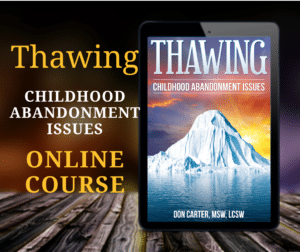
Teens with Low Self Esteem
Teens with low self-esteem are struggling with the age-old question “who am I” — and some are not liking the answers they are coming up with. Adolescence is a time of remaking the personality from “mom and dad’s little kid” to a full-grown, independent human being. So all of the teen years are about separating from the proverbial “apron strings.”
Identity vs. Identity Diffusion – Puberty to 20 yo
Adolescence – “Who am I”

The main task of adolescence is to answer the question “Who am I” — the answer will determine many things in life, especially for the teens with low self-esteem. Remembering that the subconscious mind is our most faithful servant, we must be careful about what we store up in there.
We must also remember that each stage of development prior to this sets the foundation upon which we build. Teens with low self-esteem have a bigger challenge than others due to negative outcomes in prior stages — it’s like starting off with a handicap. Teens with low self-esteem may range from not engaging at all in these developmental urges — resulting in emotional arrest — all the way to the opposite extreme being overly-engaged to the point of becoming uncontrollable.
The good news is that no matter how things went earlier in life, we are not destined to be stuck with those outcomes — Most pages on this website are about changing, re-configuring, and expanding neural networks associated with the implicit data stored up from these stages. Teens with low self-esteem tend to not know who they are. They can get caught up in being what others want them to be in order to gain approval and acceptance.
Or teens with low self-esteem may think that they can never become anything and give up trying to connect — becoming chronically depressed, or isolating, or getting into drugs and alcohol. Loyalty is a major virtue picked up in this stage of development – loyalty to self, to others, and to our own values and beliefs. Teens with low self-esteem tend to be a bit too loyal to others who are not as good to them in return.
There are four stages of adolescent development within this stage of human development:
- Separation – This stage of adolescent development begins with puberty at about 12 to 13 years old. It can be like the “Terrible 13’s” when the new teen finds that they have a mouth and an opinion to go with it.They can become restless, irritable, and discontent… not to mention downright rude and obnoxious. This causes strife, pitting them against their parents which is a subconscious maneuver that helps them begin pulling away in the second major emotional separation.
- Individuation – In this stage of adolescent development the teenager will “try on” different roles like they would a new outfit in order to find the one that best fits them. They may try out being an athlete one day, a musician the next, and a sophisticated intellectual the next day. They may experiment with alcohol or smoking to see how they fit with their emerging personality. Reputation and image among peers become of paramount importance during this time. Some kids take refuge in the stance that…”I fit in all groups”…freely moving from one group to another rather than making a commitment to one group in particular.
- Rebellion – With a new license can come a new attitude… it’s like “I have arrived!” in adulthood. Smoking, drinking parties, and other “grown-up” behaviors are now far game. Privacy and space to be a teenager are now demanded — or all hell may (and sometimes does) break loose. Anti-authority, anti-social, anti-conformist attitudes help the teen take mom and dad down off the pedestal so they can begin to “break the apron strings” in preparation to leave the nest soon. In order to make a clean getaway, kids must rebel in equal proportion to how strongly parents try to hold on to the old ways. In this stage, it’s time to begin redefining the nature of the relationship away from parent-to-child toward parent-to-young-person — a major adjustment and a time of grief for many parents.
- Cooperation – At about 18-19 through 21-23 years old is the time when teens become young adults. They have left home and discovered that fighting the system doesn’t help them get what they want. They learn to cooperate with their environment in order to reach their goals in life…both short-term and long-term. They take out their body piercings, cover up their tattoos, change their hair back to one color BEFORE going to that job interview…and revert back to their “normal” self during the off hours.
Self-Assessment
Unmet needs for teens with low self-esteem can be observed in present-day symptoms. For each of the following statements assign a rank between 10 (High) and 1 (Low). Teens with low self-esteem may carry these issues throughout their adult lives.
- ___ I have difficulty going to social functions by myself because I feel so nervous.
- ___ I get tongue-tied if I run into an acquaintance unexpectedly.
- ___ If I go to a party, I tend to stay pretty close to the person I came with. I feel too shy to talk to new people.
- ___ I am uncomfortable in public. I feel self-conscious as if people are watching me.
- ___ I feel uncomfortable with my body; it’s too fat, too thin, too short, too long, too different.
- ___ I am sexually inhibited.
- ___ I like the lights off when I’m having sex.
- ___ I feel uncomfortable when I’m around a person to whom I feel attracted.
- ___ I need a second opinion on the decisions I make.
- ___ If I am wearing an accessory I like and someone makes an unflattering comment, I take it off.
- ___ If I am in a group of people, I notice the one person who does not seem to like me.
- ___ I have a hard time trusting my own judgments, so I rely on those close to me to determine what is appropriate and essential.
- ___ I smoke, do drugs, or drink alcohol excessively.
- ___ Whenever I’m nervous, I respond by putting something in my mouth, like food, drugs, or cigarettes.
- ___ When I receive news that is hard to handle, I behave in a way that later results in negative consequences.
- ___ Whenever life gets tough, I bury myself in work.
- ___ Whenever I am upset, sex is the only activity that settles me down. It doesn’t matter with whom; I just know that I need that release.
- ___ When I feel panic, I seek relief with alcohol, drugs, cigarettes, shopping, gambling, eating, Etc.
- ___ I engage in destructive activity that has severe consequences on my finances, relationships or my health.
- ___ If someone tries to order me around, I am unable to stand up for myself.
- ___ I have lost jobs because when my bosses asked me to do something I did not want to do, I reacted hostility or angrily.
- ___ If I’m driving on the freeway and someone cuts me off, I catch up with the car and try to intimidate the driver by tailgating or yelling profanities.
- ___ If I’m losing an argument, I storm out of the room and refused to discuss the matter any further.
- ___ If my boss asked me to do something that I do not want to do, I will agree but then forget or fail to complete the job.
- ___ If the driver behind me flashes his lights indicating he wants me to move out of the fast lane, I ignore and slow down even more, so that the driver is forced to go around me.
- ___ If my partner or spouse behaves the way I do not like, I will retaliate by spending money, not coming home, her secretly going out with someone else.
- ___ I like the dishes done a certain way, and I hate it when my partner or spouse does them differently.
- ___ I am very concerned with what my partner or spouse wears in public.
- ___ I agree with the political beliefs of those close to me.
- ___ Even if I do not like the styles, I buy clothes that the magazines say are the most fashionable because I want to fit in and be like everyone else.
- ___ I feel if you saw me in a crowd, you would not notice me because there’s nothing about me that stands out.
If you find significant symptoms here, you may benefit from Don’s Thawing Childhood Abandonment Issues online course.






